Surface roughness meter HR3200

Surface roughness meter HR3200

Overview
The surface roughness meter HR3200 is an inductive roughness meter, which is a new product developed by our company. This instrument is suitable for production sites and can measure the surface roughness of a variety of machined parts. The corresponding parameters are calculated according to the selected measurement conditions, and all measurement parameters and contour patterns are clearly displayed on the LCD display.
Features:
Multi-parameter measurement: Ra, Rz, Ry, Rq, Rp, Rm, Rv, Rt, R3z, Rmax, Rsk, Rku, S, Sm, tp, Rmr, Rpc, RzJIS;
High-precision inductance sensor that improves the main structure;
Four filtering methods: RC, PC-RC, GAUSS, and D-P;
Compatible with four standards: ISO, DIN, ANSI, and JIS;
2.4-inch high-brightness OLED display, which can display Chinese, English, Japanese and Chinese languages, all parameters and graphics;
Using ARM processor, the test speed is greatly improved;
Built-in lithium-ion rechargeable battery and charging control circuit, high capacity, no memory effect, continuous working time is greater than 20 hours;
Built-in Bluetooth communication module, can connect to a Bluetooth printer, and can print all parameters and outline graphics;
The Bluetooth communication module can switch to data mode and connect wirelessly to Android data terminals such as mobile phones;
Mini-B USB interface, which can be used as a charging interface and PC communication interface;
Added storage space, the machine has built-in storage of 2M FLASH, and a Micro SD card with a maximum expansion of 32G;
It has automatic shutdown, memory and various prompts and instructions;
It is equipped with upper computer software, compatible with L.U.W multi-operating system platform;
It can be equipped with curved surface sensors, small hole sensors, deep groove sensors, measuring platforms, long rods and other accessories.
Measurement principle
When measuring the surface roughness of the workpiece, place the sensor on the measured surface of the workpiece, and the driving mechanism inside the instrument drives the sensor to slide along the measured surface in a constant speed. The sensor feels the roughness of the measured surface through the built-in contact stylus. At this time, the roughness of the measured surface of the workpiece causes the contact stylus to produce a longitudinal displacement. This displacement changes the inductance of the sensor inductance coil, thereby generating an analog signal proportional to the measured surface roughness at the output end of the phase-sensitive rectifier. The signal enters the data acquisition system after amplification and level conversion. The ARM chip performs digital filtering and parameter calculations. The measurement results are read out on the liquid crystal display, can also be output on the printer, and can also communicate with the PC.
sensor
Detection principle: inductive
Measurement range: 160μm
Needle tip radius: 5μm
Needle tip material: Diamond
Temperature measurement: 4mN (0.4gf)
Stylus angle: 90°
Longitudinal radius of the conductor: 45mm
Driver parameters
Maximum drive stroke: 17.5mm/0.7inch
Drive speed:
When sampling length = 0.25mmVt = 0.135mm/s
When sampling length = 0.8mmVt = 0.5mm/s
When sampling length = 2.5mmVt = 1mm/s
Vt=1mm/s when returning
Display error:Not greater than ±10%
Display value variability:No more than 6%
Show content
Menu: Modify measurement conditions, calibrate display values, select communication with PC or print output, etc.
Parameters: Compatible with four standard roughness parameters: ISO, DIN, ANSI, and JIS.
Graphics: Unfiltered contour graphics, filtered contour graphics and TP curves.
Prompt information: measurement information, menu prompt information, error information, battery level and shutdown prompt information.
Contours and filters
contour | filter |
Filter profile | RC |
PC-RC | |
Gauss | |
Unfiltered profile | D-P |
Resection length/sampling length l
Automatic, 0.25mm, 0.8mm, 2.5mm optional
Assessment length ln
(1~5)lOptional
Roughness parameters and display range
parameter | Display range |
Ra, Rq | 0.005μm ~ 16μm |
Rz, R3z Ry, Rt Rp, Rm | 0.02μm ~ 160μm |
Sk | 0 ~ 100% |
S Sm | 1mm |
tp | 0 ~ 100% |
Measurement range and resolution
Measurement range | Resolution |
automatic | 0.01μm ~0.04μm |
±20μm | 0.01μm |
±40μm | 0.02μm |
±80μm | 0.04μm |
Temperature/humidity range
Working environment: Temperature: 0 ~ 40℃
Humidity: <90% RH
Storage and transportation environment: Temperature: -40℃ ~ 60℃
Humidity: <90% RH
Dimensions and weights
140×52×48mm, about 440g.
Standard configuration
name | quantity | name | quantity |
RoughnessHost | 1 | Analysis software USB drive | 1 |
Standard sensor | 1 | Calibration value pad | 1 |
Bluetooth printer | 1 | Calibration displaymodel | 1 |
Power adapter | 1 | Data connection cable | 1 |
manual(Chinese) | 1 | Height adjustment frame | 1 |
Certificate of conformity | 1 | Warranty card | 1 |
Packing list | 1 | Instrument box | 1 |
- Previous article:Pen hardness meter HL5106
- Next article:Surface roughness meter HR3100
Recommended informationNEWS
- [2022-08-26]Do you know how important the configuration of the universal tensile test machine is? The configuration of the universal tensile test machine
- [2022-08-26]Introduction to the functions of the repeated bending test machine of metal material
- [2022-08-26]How to use the universal tensile testing machine?
- [2022-08-26]What are the key points of the lateral deformation test of electronic universal testing machines?
- [2022-08-12]Testing method of metal rods by testing machine
- [2022-08-12]Electronic universal testing machine-Plastic film tensile testing machine
- [2022-08-04]How to install a clamp to save effort
- [2022-08-04]What are the causes of oil leakage in the universal pressure test machine?
- [2022-08-04]Tension machine
- [2022-07-29]Staff must conduct necessary inspections on the different structures and parts of the fatigue testing machine
- [2022-07-29]In practical applications, friction between parts is inevitable.
- [2022-07-29]Methods to avoid positioning errors of electronic universal test machines
- [2022-07-29]What errors are prone to occur when using the fatigue test machine
- [2022-07-29]Performance characteristics of electronic universal testing machine and preparations before operation
- [2022-07-20]What are the safety and service life of the woven bag tensile tester?
- [2022-07-20]Several categories of tension machine sensors
- [2022-07-20]Calibration of universal testing machine sensor
- [2022-07-20]Introduction to technical problems of material tensile testing machine


















